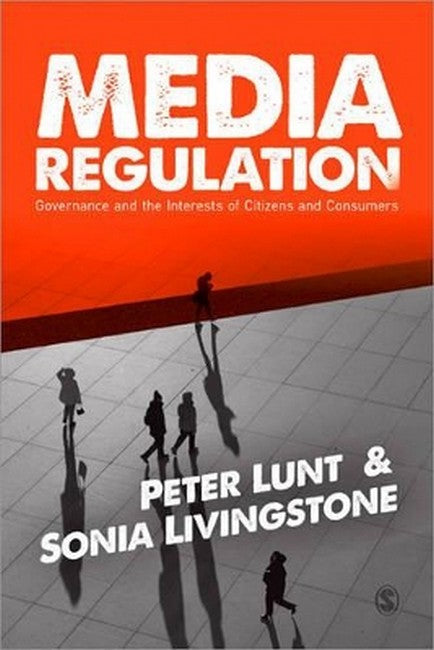Peter Lunt is Professor of Media and Communication at the University of Leicester. His research interests include audience research, popular television, the public understanding of media regulation and media and social theory. He is currently working on a project on media, history and memory and on the changing understanding of public service broadcasting. He is the author of five books including Talk on Television (with Sonia Livingstone, Routledge, 1994) and Stanley Milgram (Palgrave, 2010) and many academic papers and chapters. Sonia Livingstone is Professor of Media and Communications at the London School of Economics and Political Science. With longstanding interests in audiences, policy, citizen values and changes in media environments and infrastructures, she has most recently been focused on digital and online technologies and the opportunities and risks these offer to children and young people in private and public spaces. She has coordinated and led the EU Kids Online project since 2006.
Request Academic Copy
Please copy the ISBN for submitting review copy form
Description
Media and Communications Regulation and the Public Interest Introduction Regulation and the Role of the State Regulation, Civil Society and the Public Sphere Market Innovation versus Social Democratic Values Introducing the Case Studies Regulation and the Public Interest From Government to Governance The Theory of Regulation Strategies of Regulation New Labour, Social Democracy and Regulation The European Context The UK Context Regulation and the Public Interest Ofcom's Core Purposes: A Discursive Struggle Media Regulation and the Implied Audience The Communications Act 2003: In Whose Interest? Ofcom's Remit: Interpreting Its Primary Duties Actions to Further Citizens' and Consumers' Interests Citizen Interests in a Wider Perspective Ofcom as a Regulatory Agency Ofcom's Remit and Rationale From Guiding Principles to Working Practices Core Business: Telecommunications, Spectrum Management and Media Plurality Ofcom as an Institution in the Public Sphere The Content Board and (Communications) Consumer Panel Defining Citizen and Consumer Interests in Practice Public Views of Regulation Conclusion Ofcom's Review of Public Service Television Introduction Public Service Broadcasting in the 1980s and 1990s Ofcom's Remit in Reviewing Public Service Television Ofcom's First Review of Public Service Television A Public Service for All Ofcom's Second Public Service Television Review Ofcom's Consultation on the Second Review Conclusion Media Literacy A New Lease of Life for an Old Policy A Puzzling Task for the New Regulator Definitional Diversity in Europe Media Literacy as a Neo-Liberal Policy The Politics of Media Literacy From Media Literacy to Digital Participation From Principles to Practice From Individual Skills to Social Capabilities Conclusion Advertising Regulation and Childhood Obesity Introduction Regulating Advertising to Children The Challenges of Evidence-Based Policy Regulatory Action and Reaction Regulatory Effectiveness? Reflections on Evidence-Based Policy Conclusion Community Radio Introduction The Community Radio Order 2004 Regulating Community Radio Evaluating Ofcom's Regulation of Community Radio Conclusion Conclusions A Change of Direction The Power to Make Policy On the Value of an Independent Regulator Conclusions Afterword
An exemplary study of how media regulation works (and, by implication, how it could work better) set within a wider discussion of democratic theory and political values. It will be of interest not only to students and scholars but to people around the world grappling with the same problem: the need to regulate markets, and the difficulty of doing this well. -- James Curran Separately and jointly, Lunt and Livingstone have authored many fine writings, but this is arguably the best of the bunch! What makes this research special - even timeless for regulatory 'theory' - is its positioning amidst a set of well-defined philosophical and political tensions, especially between the interests of consumers and those of citizens. -- Jay G. Blumler In the 1970s, media regulation began to be analyzed as a political development; in the 1980s, as a facet of and contributor to globalization; in the 1990s, as a discourse; and in the first decade of the 20th century, as exemplars and evidence of changes in the nature of the state itself. In this book, Lunt and Livingstone rely upon their deep knowledge of audiences to treat British media regulator Ofcom as an agent within the public sphere, adding to the interdisciplinary toolkit of those involved in policy analysis and providing a model that could usefully be applied to other types and loci of regulatory processes. -- Sandra Braman Media Regulation's strength lies, first of all, in its multifaceted and extremely convincing analysis of Ofcom as a regulatory institution in the UK context. The variety of case studies adds to the richness and balance of the arguments provided. Secondly, the book provides a more general analysis of modern-day media governance per se. It shows a sensitivity to how changing paradigms in media regulation have an effect on how media institutions and regulatory authorities interact to constitute modern-day media as both a consumer good and as a democratic tool in the public sphere. -- Mette Marie Roslyng - Dept. of Communication and Psychology, University of Aalborg, Denmark

